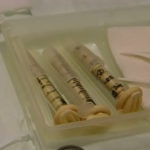…by Colin Brewer…
Greetings from London and thanks, everybody, for what are — amazingly for this field — almost entirely positive comments on the ‘language’ analogy that I first suggested in 1989 and that my co-author Emmanuel Streel and I have been writing about since 2003. (Emmanuel is a neuropsychologist but also a psychopharmacologist.) Since Marc has honoured me with an invitation to do a guest column, here it is, partially in response to comments following the previous post.
First, my removal from the medical register had absolutely nothing to do with rapid opiate detox under anaesthesia. From about 1995 to 2001, we detoxed over 700 people with this technique without any significant problems. It wasn’t even discussed at my hearing. I qualified in 1963 and when I saw my first heroin detox two years later, it was routine to use generous sedation if severe distress tempted patients to withdraw from treatment rather than from heroin. If patients can withdraw — slowly or quickly — without much medication, that’s fine by me, but if they can’t (and there are many in that category) I think it is the traditional duty of doctors to make unpleasant procedures as comfortable as possible. Does anyone — apart from the extreme ‘no pain, no gain’ fundamentalists — seriously disagree with that? Consequently, for patients who wanted to try or resume abstinence, we offered a wide range of withdrawal techniques, from slow tapers, through 4-5 day withdrawal with mainly oral sedation to 24hr techniques under oral and/or intramuscular sedation to i/v sedation and full General Anaesthesia. (Historical note: at one point, I was threatened with a lawsuit by the Spanish-Israeli CITA group who claimed I had infringed their ‘patented’ GA detox technique. Apart from the fact that the use of particular drugs (as opposed to the details of their manufacture) can’t be patented in Europe, I had described and published the technique, in an admittedly obscure journal, several years before they first used it.)
Because addiction treatment provided by the National Health Service (NHS) was so lousy in the 1980s and 90s (for example, the addiction establishment were very anti-methadone maintenance from 1980-1999), there were long waiting lists for in-patient withdrawal, and when they were eventually admitted, completion rates in one of our flagship centres were barely 25%, of whom nearly half had relapsed four weeks later. We therefore found ourselves treating many people who would not normally have considered — or been able to afford — private treatment, and quite a few more prosperous patients whose insurance had refused to continue paying or who had simply impoverished themselves through repeated self-funded treatment. For this large group, we devised a home detox programme that involved training the family to act as carers. As with all our detoxes, after completion and naltrexone (NTX) induction, we very strongly encouraged patients to take family-supervised oral naltrexone for at least six months and, after 1997,  to have a NTX implant, to increase the chances that they would get through the crucial and often difficult first couple of months, when relapse rates are highest. We did around 2000 home detoxes before one family fatally misunderstood the instructions. Naturally, I feel bad about that but I don’t feel bad about trying to devise affordable treatment. I think that case made the difference between a reprimand and being removed from the register, but many addiction clinicians and academics in Britain (and several abroad who gave evidence for me) will tell you that the establishment were out to get me and were looking for excuses.
to have a NTX implant, to increase the chances that they would get through the crucial and often difficult first couple of months, when relapse rates are highest. We did around 2000 home detoxes before one family fatally misunderstood the instructions. Naturally, I feel bad about that but I don’t feel bad about trying to devise affordable treatment. I think that case made the difference between a reprimand and being removed from the register, but many addiction clinicians and academics in Britain (and several abroad who gave evidence for me) will tell you that the establishment were out to get me and were looking for excuses.
Marc asked me if I’d ever written anything about the hearings. I haven’t, and these are my first published comments, but the two most bizarre features were (1) some three weeks spent by the panel trying, unsuccessfully, to prove that a case not written by one of our counsellors, whose handwriting was similar to mine, had actually been written by me, even though one of his notes read: ‘Must discuss this with CB’! and (2) a serious — as in six-fold — miscalculation by two of our leading academics of the methadone equivalent of another opiate.
 If Marc thinks I look a bit weird in some of the online images, that’s probably because they were taken when I was trying to force my way through a rat-pack of paparazzi after the final hearing. Fortunately, the clinic I set up continues and is still doing most of the things that we had been doing up to the hearings. Some of those — e.g. using slow-release morphine for people who don’t get on well with methadone or buprenorphine — are now pretty normal, at least outside the USA. The clinic is also expanding its patient groups to include the growing problem — though it’s still small by US standards — of prescription opiate abuse and the management of ‘therapeutic addiction’ to opiates in pain problems. I only have an advisory role these days but we hope to extend what Emmanuel and I suggested should be called ‘Antagonist-Assisted Abstinence’ (AAA – geddit?) to benzodiazepines. Using s/c or slow i/v flumazenil infusions, it’s quite easy to take people off fistfuls of diazepam and other benzodiazepines in five days with very little discomfort, and a flumazenil implant is being developed in Australia.
If Marc thinks I look a bit weird in some of the online images, that’s probably because they were taken when I was trying to force my way through a rat-pack of paparazzi after the final hearing. Fortunately, the clinic I set up continues and is still doing most of the things that we had been doing up to the hearings. Some of those — e.g. using slow-release morphine for people who don’t get on well with methadone or buprenorphine — are now pretty normal, at least outside the USA. The clinic is also expanding its patient groups to include the growing problem — though it’s still small by US standards — of prescription opiate abuse and the management of ‘therapeutic addiction’ to opiates in pain problems. I only have an advisory role these days but we hope to extend what Emmanuel and I suggested should be called ‘Antagonist-Assisted Abstinence’ (AAA – geddit?) to benzodiazepines. Using s/c or slow i/v flumazenil infusions, it’s quite easy to take people off fistfuls of diazepam and other benzodiazepines in five days with very little discomfort, and a flumazenil implant is being developed in Australia.
The clinic still does plenty of maintenance treatment, and I was told recently that the new emphasis on ‘recovery’ (read: we don’t like indefinite methadone maintenance) means that, as in the 1980s, increasing numbers of well-functioning methadone-maintenance patients — many with good jobs that they don’t want to jeopardise by having to take weeks or  months off for withdrawal — are being put on forced reductions. I never claimed to be perfect (as we say in the trade, ‘if you haven’t made any mistakes. you’re not seeing enough patients’) but I don’t think that anything I did caused remotely as much misery and disaster to opiate addicts as the policies encouraged by the addiction establishment in the face of mounting evidence for the value of methadone-maintenance treatment.
months off for withdrawal — are being put on forced reductions. I never claimed to be perfect (as we say in the trade, ‘if you haven’t made any mistakes. you’re not seeing enough patients’) but I don’t think that anything I did caused remotely as much misery and disaster to opiate addicts as the policies encouraged by the addiction establishment in the face of mounting evidence for the value of methadone-maintenance treatment.
Finally, I wrote a paper a few years ago suggesting that harm reduction in family planning (avoiding unwanted pregnancies) could teach some useful lessons to conventional harm reduction (avoiding unwanted addictions), in that it uses a variety of techniques and tries to fit the treatment to the particular needs of the patient, rather than the prevailing ‘one size fits all, take it or leave it’ approach of so many clinics and — even worse — rehabs. I’ll provide references to this and other papers on request.

Leave a Reply